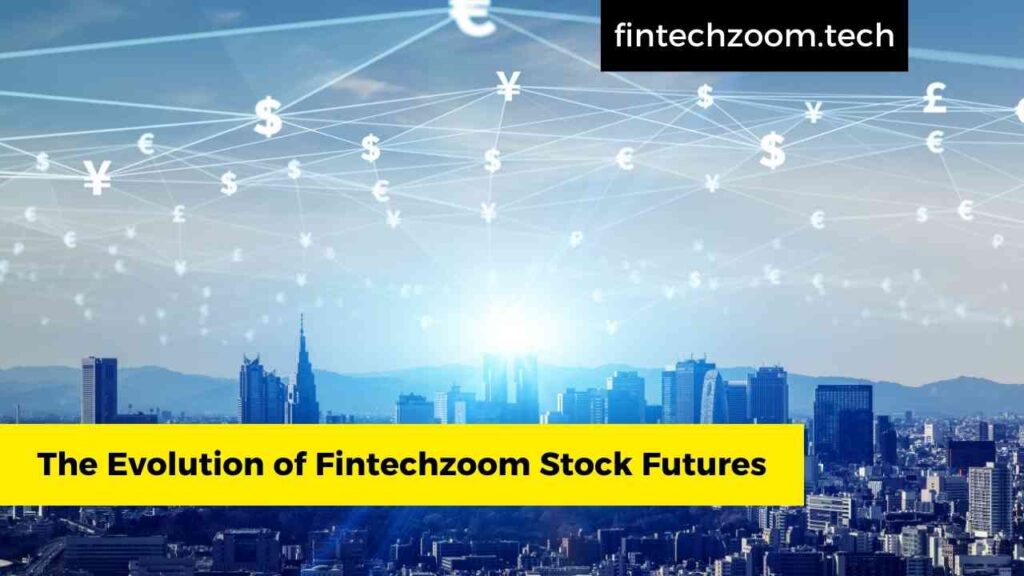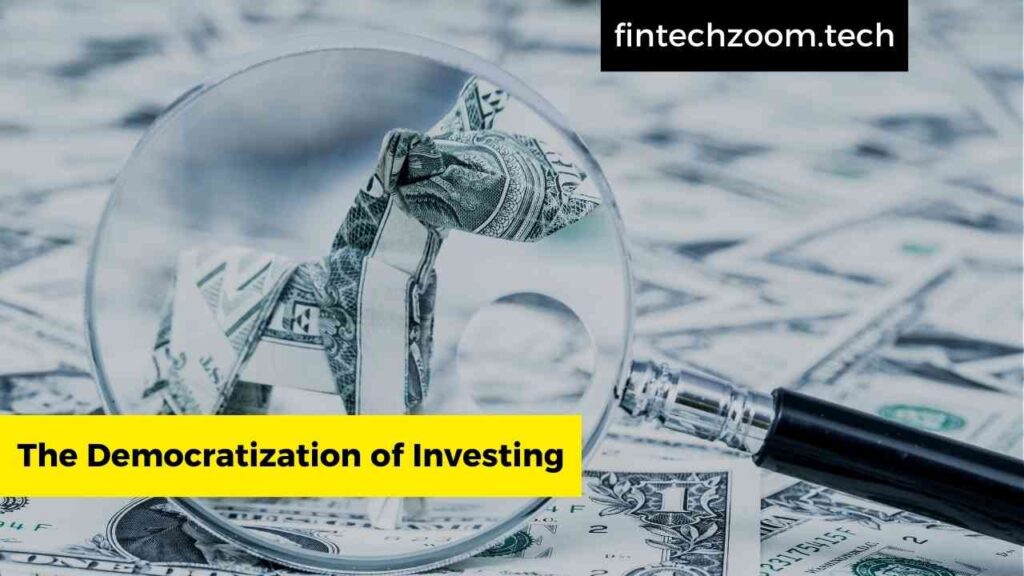Table of Contents
Introduction
Welcome to the exciting realm of FintechZoom stock futures! Imagine a world where technology is changing how we handle money faster than ever before. That’s what’s happening right now with fintech – those clever companies using tech to shake up the financial world. They’ve made things like banking on your phone and using blockchain (fancy digital ledgers) for secure transactions totally normal. And guess what? The cool part is that we can actually invest in the future of finance through something called stock futures.

The Evolution of Fintechzoom STock futures
The fintech revolution didn’t happen overnight; it’s the culmination of decades of innovation and disruption. In the early days, fintech startups challenged traditional financial institutions with innovative products and services, leveraging technology to offer greater convenience, efficiency, and accessibility. From peer-to-peer lending platforms to robo-advisors, these pioneers paved the way for the digital transformation of finance.
As fintech companies gained traction and market share, investors took notice of their disruptive potential. Venture capitalists poured billions of dollars into fintech startups, fueling their growth and expansion. Meanwhile, established players in the financial industry began to embrace fintech, either through partnerships and acquisitions or by developing their own digital offerings. Today, fintech has evolved from a disruptor to a dominant force in the global economy, reshaping the way we transact, invest, and manage our finances.
Riding the Fintech Wave
Investing in fintech stock futures offers a unique set of opportunities and challenges for investors. On one hand, the rapid pace of innovation and adoption in the fintech sector can lead to significant growth opportunities. Companies that successfully leverage technology to disrupt traditional financial services stand to reap substantial rewards, potentially delivering outsized returns for investors.
On the other hand, the fintech landscape is also fraught with risks and uncertainties. Competition is fierce, with new entrants constantly challenging incumbents and established players striving to maintain their market dominance. Regulatory scrutiny is another key consideration, as fintech companies navigate a complex web of regulations and compliance requirements. Moreover, the fast-paced nature of the industry means that trends can shift rapidly, requiring investors to stay vigilant and adapt their strategies accordingly.
Decoding FintechZoom
FintechZoom is a leading financial news and information platform that provides comprehensive coverage of the fintech industry. From breaking news and market analysis to in-depth features and interviews, FintechZoom Stock Futures offers a wealth of resources for investors seeking to stay informed and engaged. But navigating the platform can be daunting for newcomers, with its vast array of articles, videos, and data sets.
Fortunately, FintechZoom Stock Futures offers a range of tools and features to help users make sense of the wealth of information available. Its intuitive interface allows users to easily browse and filter content based on their interests and preferences. Meanwhile, its robust search functionality enables users to quickly find relevant articles and insights on specific topics or companies. Whether you’re a seasoned investor or a curious newcomer, FintechZoom Stock Futures provides the tools and resources you need to stay ahead of the curve in the fast-paced world of fintech investing.
The Rise of Digital Payments
One of the most significant trends driving the growth of fintech is the rise of digital payments. As consumers increasingly embrace cashless transactions, fintech companies have stepped in to fill the gap, offering a wide range of digital payment solutions tailored to meet the needs of today’s consumers. From mobile wallets and peer-to-peer payment apps to contactless payment technology, fintech firms are reshaping the way we pay for goods and services.
At the forefront of this trend are companies like PayPal, Square, and Stripe, which have built expansive ecosystems around their payment platforms. PayPal, for example, offers a suite of services beyond its core payment processing business, including peer-to-peer payments, merchant services, and digital wallets. Similarly, Square has expanded its offerings to include business loans, payroll services, and cryptocurrency trading, positioning itself as a one-stop shop for small businesses.

The Democratization of Investing
Another key driver of FintechZoom Stock Futures rise is the democratization of investing. Traditionally, investing was the domain of wealthy individuals and institutional investors, who had access to exclusive investment opportunities and sophisticated trading tools. But fintech has leveled the playing field, making investing more accessible and affordable for the masses.
Platforms like Robinhood and SoFi have pioneered the concept of commission-free trading, allowing retail investors to buy and sell stocks, options, and cryptocurrencies without paying traditional brokerage fees. This has empowered a new generation of investors to participate in the financial markets, fueling a surge in retail trading activity. However, the democratization of investing also raises concerns about risk management and investor protection, as inexperienced traders may be more susceptible to market volatility and speculative bubbles.
The Fintech Ecosystem
Behind the scenes, the fintech ecosystem is a complex web of interconnections and partnerships that drive innovation and collaboration. FintechZoom Stock Futures companies often collaborate with each other, as well as with traditional financial institutions and technology providers, to deliver seamless and integrated solutions to consumers and businesses.
For example, a FintechZoom Stock Futures startup may partner with a bank to offer lending services, leveraging the bank’s infrastructure and regulatory expertise while providing a more streamlined and user-friendly experience. Similarly, fintech companies may integrate with third-party software providers to enhance their products and services, tapping into a vast ecosystem of developers and technology partners. These partnerships not only drive innovation but also enable fintech companies to scale and expand their reach more quickly and efficiently.
Navigating the Regulatory Landscape
As fintech continues to disrupt traditional financial services, regulators around the world are grappling with how best to oversee and regulate this rapidly evolving industry. On one hand, regulators seek to promote innovation and competition, ensuring that consumers have access to innovative and affordable financial products and services. On the other hand, they must also safeguard the stability and integrity of the financial system, protecting consumers from fraud, abuse, and systemic risks.
The regulatory landscape for fintech varies widely from one jurisdiction to another, with different countries taking different approaches to oversight and supervision. In some cases, regulators have introduced new frameworks and guidelines specifically tailored to fintech activities, while in others, existing regulations are being adapted to accommodate technological advancements. This patchwork of regulations presents challenges for fintech companies operating across borders, as they must navigate a complex and evolving regulatory landscape while ensuring compliance with multiple jurisdictions.
Fintech and Cybersecurity
With the proliferation of digital transactions and the growing reliance on technology, cybersecurity has emerged as a critical concern for FintechZoom Stock Futures companies and their customers. As custodians of sensitive financial data and transactions, FintechZoom Stock Futures firms are prime targets for cyberattacks, ranging from data breaches and ransomware attacks to phishing scams and malware infections.
To mitigate these risks, FintechZoom Stock Futures companies invest heavily in cybersecurity measures, deploying advanced encryption technologies, multi-factor authentication, and threat detection systems to safeguard their systems and data. They also collaborate with industry partners, regulators, and cybersecurity experts to share information and best practices, enhancing collective resilience against emerging threats. However, cybersecurity is an ongoing arms race, with attackers constantly evolving their tactics and techniques to exploit vulnerabilities and evade detection. As such, FintechZoom Stock Futures companies must remain vigilant and proactive in their efforts to protect against cyber threats.

The Role of Artificial Intelligence in Fintech Innovation
Artificial intelligence (AI) is playing an increasingly prominent role in driving innovation and efficiency in the fintech industry. From algorithmic trading and risk management to fraud detection and customer service, AI-powered solutions are transforming every aspect of financial services, enabling companies to analyze vast amounts of data, identify patterns and trends, and make data-driven decisions in real-time.
For example, robo-advisors use AI algorithms to automate investment management tasks, such as portfolio construction and rebalancing, offering personalized investment advice and management at a fraction of the cost of traditional financial advisors. Similarly, chatbots and virtual assistants leverage natural language processing and machine learning to provide round-the-clock customer support, answering queries, resolving issues, and guiding users through complex processes with human-like interaction.
The Rise of Decentralized Finance (DeFi)
Decentralized finance (DeFi) represents a paradigm shift in the FintechZoom Stock Futures industry, offering a new model for financial services that is open, transparent, and accessible to anyone with an internet connection. Built on blockchain technology, DeFi platforms enable peer-to-peer lending, borrowing, trading, and asset management without the need for traditional intermediaries such as banks or brokerages.
One of the key innovations driving the growth of DeFi is smart contracts, self-executing contracts that automatically enforce the terms and conditions of a financial agreement without the need for intermediaries. This eliminates the need for trust and reliance on centralized institutions, enabling users to transact directly with each other in a trustless and permissionless manner. However, DeFi also presents unique challenges and risks, including smart contract bugs, security vulnerabilities, and regulatory uncertainty.
Fintech and Financial Inclusion
One of the promises of FintechZoom Stock Futures is its potential to promote financial inclusion by expanding access to financial services for underserved and marginalized populations. Historically, traditional financial institutions have struggled to reach low-income individuals, small businesses, and rural communities due to high costs, limited infrastructure, and regulatory barriers. FintechZoom Stock Futures companies are leveraging technology to overcome these challenges, offering innovative solutions that democratize access to banking, credit, and investment opportunities.
For example, mobile banking apps and digital wallets enable people in remote areas to manage their finances and make payments using nothing more than a smartphone. Peer-to-peer lending platforms connect borrowers with investors, providing an alternative source of credit for those who may not qualify for traditional loans. Meanwhile, micro-investment apps allow individuals to start investing with small amounts of money, opening up wealth-building opportunities for the masses.
Fintech and Sustainable Finance
As concerns about climate change, social inequality, and corporate governance continue to mount, investors are increasingly turning to sustainable finance as a means of aligning their investments with their values and principles. FintechZoom Stock Futures companies are at the forefront of this movement, offering innovative solutions that promote environmental sustainability, social responsibility, and ethical business practices.
For example, green FintechZoom Stock Futures startups are developing platforms that enable individuals and institutions to invest in renewable energy projects, sustainable agriculture, and conservation efforts, generating financial returns while driving positive social and environmental impact. Similarly, impact investing platforms connect investors with companies and organizations that are addressing pressing social and environmental challenges, providing capital to support their mission-driven initiatives.

Fintech and the Future of Banking
The traditional banking model is undergoing a seismic shift, as consumers increasingly embrace digital banking alternatives known as neobanks. Unlike traditional banks, which operate brick-and-mortar branches and rely on legacy systems, neobanks are digital-first institutions that offer banking services exclusively through mobile apps and online platforms.
Neobanks leverage technology to deliver a seamless and intuitive banking experience, with features like instant account opening, fee-free transactions, and personalized financial insights. By eliminating the overhead costs associated with physical branches and legacy infrastructure, neobanks are able to offer lower fees, higher interest rates, and better customer service than their traditional counterparts. As a result, they have attracted millions of users worldwide, disrupting the banking industry and forcing incumbents to adapt or risk obsolescence.
The Convergence of Finance and Technology
The lines between finance and technology continue to blur as big tech companies enter the fray, leveraging their vast resources and user bases to disrupt traditional financial services. From e-commerce giants like Amazon and Alibaba to tech titans like Google and Apple, big tech firms are increasingly expanding into FintechZoom Stock Futures , offering a wide range of financial products and services to their customers.
For example, Amazon has launched Amazon Pay, a digital payment service that allows users to make purchases on third-party websites using their Amazon accounts. Meanwhile, Apple has introduced Apple Card, a credit card that integrates seamlessly with the Apple ecosystem, offering cashback rewards and enhanced security features. These developments have raised concerns about data privacy, antitrust, and the concentration of economic power, prompting regulators to scrutinize the growing influence of big tech in finance.
Addressing the Needs of Freelancers and Independent Workers
The rise of the gig economy has created new opportunities and challenges for FintechZoom Stock Futures companies, as freelancers, independent contractors, and gig workers seek financial solutions tailored to their unique needs and preferences. Unlike traditional employees, gig workers often have irregular income streams, variable expenses, and limited access to employer-sponsored benefits such as health insurance and retirement savings plans.
FintechZoom Stock Futures companies are stepping in to address these pain points, offering a range of products and services designed specifically for the gig economy. For example, neobanks like Chime and Varo offer fee-free checking accounts and early access to wages, helping gig workers manage their cash flow more effectively. Meanwhile, platforms like Gig Wage and Steady provide tools for budgeting, invoicing, and tax planning, empowering gig workers to take control of their finances and build financial security.
Fintech and Cross-Border Payments
Cross-border payments have long been a pain point for businesses and consumers alike, plagued by high fees, slow settlement times, and opaque exchange rates. FintechZoom Stock Futures companies are leveraging technology to streamline and simplify cross-border payments, offering faster, cheaper, and more transparent alternatives to traditional banks and money transfer operators.
For example, companies like TransferWise and Revolut use blockchain technology and peer-to-peer networks to facilitate international money transfers at lower cost and higher speed than traditional banks. Meanwhile, stablecoin issuers like Tether and USDC offer digital currencies pegged to fiat currencies, enabling instant and borderless payments without the volatility of cryptocurrencies like Bitcoin and Ethereum. These innovations are transforming the way businesses and individuals send and receive money across borders, unlocking new opportunities for trade, commerce, and financial inclusion.

Fintech and Real Estate
The real estate industry is ripe for disruption, and FintechZoom Stock Futures companies are leading the charge with innovative solutions that revolutionize how properties are bought, sold, and financed. From crowdfunding platforms and online marketplaces to blockchain-powered property registries and tokenized assets, FintechZoom Stock Futures is reshaping every aspect of the real estate value chain.
Crowdfunding platforms like Fundrise and RealtyShares enable investors to pool their capital and invest in real estate projects ranging from residential developments to commercial properties, offering access to asset classes that were previously out of reach for individual investors. Meanwhile, blockchain technology is being used to streamline property transactions, reduce fraud, and increase transparency in real estate markets around the world. And with the emergence of tokenized assets, investors can now buy and sell fractions of real estate properties on blockchain-powered platforms, unlocking liquidity and diversification opportunities in a traditionally illiquid and opaque asset class.
Fintech and Health-Tech
The convergence of fintech and health-tech represents a powerful force for innovation and disruption, as technology transforms both the finance and healthcare industries in profound ways. From digital health records and telemedicine to health savings accounts and wellness incentives, FintechZoom Stock Futures companies are leveraging technology to improve access, affordability, and outcomes in healthcare.
For example, health savings accounts (HSAs) enable individuals to save and invest funds for qualified medical expenses tax-free, offering a tax-efficient way to cover healthcare costs while building long-term savings. Meanwhile, digital health platforms like Babylon Health and Lemonaid Health provide virtual consultations and prescriptions, allowing patients to access quality care from the comfort of their homes. These innovations are not only making healthcare more accessible and affordable but also driving greater engagement and empowerment among patients, leading to better health outcomes and lower costs in the long run.
Also Read: DISCOVERING THE STRENGTH OF FINTECHZOOM META STOCK 2024
Conclusion:
As we wrap up our journey through the world of FintechZoom stock futures, one thing is abundantly clear: the future of finance is brimming with excitement, opportunity, and innovation. From digital payments and blockchain technology to artificial intelligence and decentralized finance, FintechZoom Stock Futures is reshaping the way we transact, invest, and interact with money in ways we never thought possible.
Faq About FintechZoom Stock Futures
Q1. How do stock futures work?
Ans: Stock futures are contracts to buy or sell stocks at a predetermined price on a future date. Let’s say you believe a stock will rise in value. You can buy a futures contract, agreeing to purchase the stock at today’s price on a specified date in the future. If the stock price goes up, you can sell the futures contract for a profit. Conversely, if the stock price falls, you may incur a loss.
Q2. How much money do I need to trade futures?
Ans: The amount of money needed to trade futures varies depending on factors like the contract’s size and the broker’s requirements. Futures contracts typically require a margin deposit, which is a fraction of the contract’s total value. This margin acts as collateral and ensures that you can fulfill your obligations under the contract. However, it’s essential to remember that trading futures involves leverage, meaning you can control a larger position with a smaller amount of capital. While leverage can amplify gains, it also increases the risk of substantial losses.
Q3. What are the different types of futures?
Ans: There are various types of futures contracts covering a wide range of asset classes, including commodities, currencies, interest rates, and stock indices. Commodity futures allow investors to speculate on the price movements of commodities like gold, oil, and grains. Currency futures involve buying or selling currencies at a specified exchange rate. Interest rate futures are based on the future value of interest-bearing securities like Treasury bonds. Stock index futures track the performance of a specific stock index, such as the S&P 500 or Nasdaq 100.
Q4. How can I make money investing in futures?
Ans: There are several strategies for making money investing in futures, depending on your risk tolerance and investment objectives. One common approach is speculation, where you buy or sell futures contracts based on your predictions of future price movements. For example, if you believe a stock index will rise, you can buy index futures to profit from the price increase. Another strategy is hedging, where you use futures contracts to offset the risk of adverse price movements in your portfolio. For instance, if you own stocks and fear a market downturn, you can sell stock index futures to protect your investments against losses. Additionally, arbitrage involves exploiting price discrepancies between related assets to generate profits. Arbitrageurs buy low and sell high simultaneously, profiting from the price differential.
Q5. How do I manage risk when trading futures?
Ans: Managing risk is crucial when trading futures to protect your capital and minimize losses. One key risk management technique is setting stop-loss orders, which automatically trigger a sale if the futures price reaches a predetermined level. This helps limit potential losses and prevents emotional decision-making during volatile market conditions. Additionally, diversifying your portfolio by trading multiple futures contracts across different asset classes can reduce your exposure to specific risks. It’s also essential to stay informed about market developments and use technical and fundamental analysis to make informed trading decisions. Finally, maintaining discipline and sticking to your trading plan can help you avoid impulsive decisions and stay on track towards your investment goals.














1 thought on “FintechZoom Stock Futures Comprehensive Guide 2024”